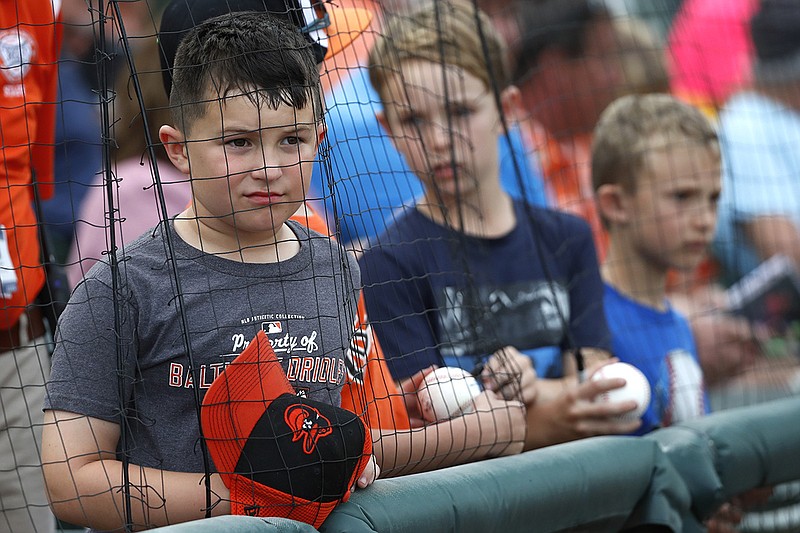Back on March 25, the nation still coming to grips with the coronavirus pandemic, an imploding economy and a world suddenly devoid of organized sports of any kind, Major League Baseball commissioner Rob Manfred told ESPN the following:
"The one thing I know for sure is baseball will be back. Whenever it's safe to play, we'll be back. Our fans will be back, our players will be back, and we will be part of the recovery, the healing in this country."
Really?
REALLY?
OK, so anyone can make a reasonable argument about whether or not it's safe to play anything that involves as many as two people forced to share space in close quarters. And you can't get much closer than a baserunner and first baseman standing next to each other at the bag. And what about the occasional tag at home plate? No social distancing there.
But this ongoing feud between MLB's owners and players that now appears to be threatening the season isn't really about player and umpire safety. It's about greed, plain and simple. And both sides are guilty of it.
Which is why Manfred, even though the owners of MLB's 30 teams pay his salary, should side with neither the owners nor the players' union, but rather the fans, who justifiably have next to zero sympathy for either side in this pathetic tug-of-war.
Forget prorated salaries and postseason television revenue. Forget that there's almost no way that the quality of the product on the field will mirror past seasons, because spring training will be pretty much cut in half and the regular season might last no more than 70 games.
Instead - because the owners and the players don't seem to care about them - Manfred must, at least this once, focus on the fans and what they've been through and are continuing to go through.
If all we'd had to fear was the fear of COVID-19 itself these past three months, that would have been reason enough for baseball's billionaire owners and millionaire players to give the fans a break.
But it's now become so much more than that. We have never seen systemic racism cause more of a national open wound than right now following the senseless, appalling deaths of African Americans George Floyd, Breonna Taylor and Rayshard Brooks at the hands of law enforcement. The return of baseball won't and shouldn't distract from those atrocities, but it could ever so slightly ease tensions here and there for a few hours at a time.
Beyond that, when the unemployment rate has gone from less than 4% at the dawn of March to more than 13% today - a jump of roughly 300% in a little more than 12 weeks - the sympathy is below zero for grown men having to get by on even 70% of their multimillion-dollar salaries while playing a kid's game.
Put another way, while the players concern themselves with downsizing from Ruth's Chris Steakhouse to Outback, the average American is adjusting to generic mac-n-cheese instead of Kraft.
A strong commissioner would be hammering that point home on an hourly basis to players and owners alike. Manfred, on the other hand, seems incapable of such leadership.
Instead, he told the media less than a week ago: "We're going to play baseball in 2020, 100%," then backtracks on Monday night, confiding to ESPN, "I'm not confident (we can play). I think there's real risk; and as long as there's no dialogue, that real risk is going to continue. It's just a disaster for our game."
That it is. It's everything the average American already hates about the sports he or she otherwise loves. The greed. The tone-deafness. The notion that the fans - much less those hard-working, faceless folks who clean the stadiums, sell the concessions, work security and such for wages that are often the difference between living above or below the poverty line - mean nothing. Absolutely nothing.
What should scare the heck out of both the owners and the players, as well as Manfred, is that the times they are a-changing. At warp speed. If the #BlackLivesMatter movement has taught us anything the past couple of weeks, it's the power to deliver rapid change when properly mobilized.
Should baseball fans revolt in large numbers by refusing to watch the games on television that they're probably not going to be allowed to attend, then continue to boycott them when stadiums open, baseball could find itself bankrupt, or at the very least, its players working for pennies on the dollar.
What's the great line from the Coldplay song "When I Ruled the World"?: "(I) sweep the streets I used to own."
The masses are learning they can change the narrative in a hurry when pushed too far. And it's not like we all aren't already moving on to other things in sports' absence.
We may still hurt inside and out for the return of our favorite sport, whatever that may be. But baseball hasn't ruled our sports world for decades. It's past time for America's Pastime to begin to get back on the field this season, lest it throw itself into a tailspin that might take years to recover from, if ever.
To return to a portion of Manfred's quote from March 25: "We will be part of the recovery, the healing in this country."
Right now, the owners and the players are not just part of the problem, they're the whole problem. The only healing they're doing is curing their fans of their love of baseball. And just in case they need to be reminded, sweeping streets doesn't pay nearly as well as owning them.
Contact Mark Wiedmer at mwiedmer@timesfreepress.com. Follow him on Twitter @TFPWeeds.

